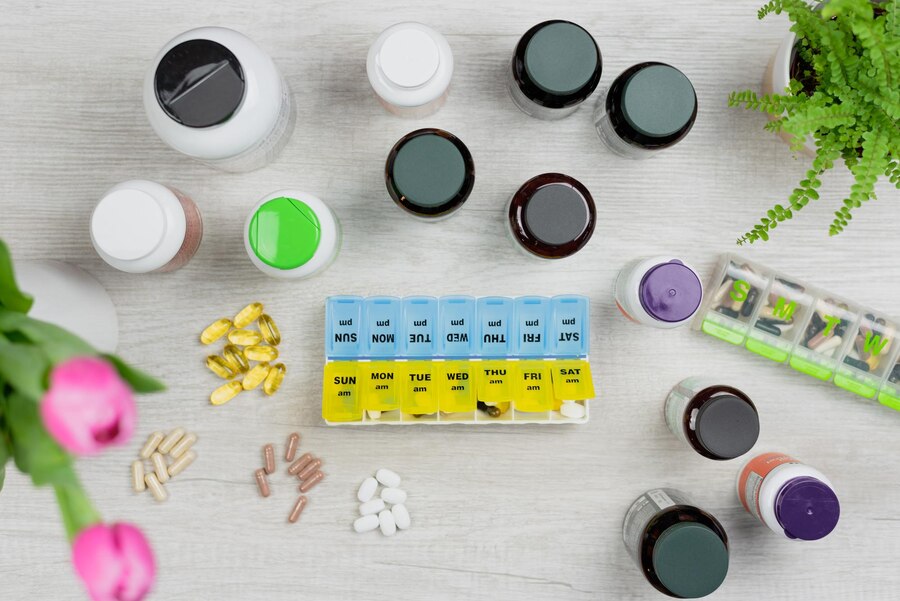Making the choice to regain your freedom, and to overcome your alcohol addiction by going to an addiction treatment center is one of the bravest and most powerful choices you’ll ever make. It shows that, though you recognize the difficulty, you still wish to create a better, healthier future for yourself. However, for some, suddenly stopping drinking might be dangerous as it can lead to withdrawal symptoms and more.
This is where professional care and prescribed alcohol detox medications come in. These facilities can help with a smoother and more permanent recovery and help you get back to normal life as quickly as possible.
But we understand that you have a lot of questions regarding the process such as how the withdrawal might feel? How can these drugs help? Where can I get the best treatment?
These are the questions that we’re answering in this blog. Read along for an in-depth dive into the medications used by addiction recovery centers for alcohol detox:
Understanding Alcohol Withdrawal
When you drink frequently, especially excessively, your body becomes accustomed to the continuous presence of alcohol. Your body goes into withdrawal and becomes unbalanced if you quit abruptly or cut back on your intake drastically. This is due to the fact that alcohol depresses the nervous system, which can then become overactive until it recalibrates when it is removed.
How Does Alcohol Withdrawal Feel Like?
The intensity of alcohol withdrawal symptoms might differ significantly based on personal circumstances, duration of alcohol consumption, and amount consumed. After your final drink, symptoms usually start a few hours later and may get worse over the course of a few days. Typical signs and symptoms include of:
- Restlessness, anxiety, and irritability
- Trouble falling asleep
- Sweating, trembling
- Nausea, vomiting
- Elevated blood pressure and heart rate
- Visual, auditory, or tactile hallucinations
When Discomfort Isn’t the Only Feeling
When alcohol withdrawal gets severe, delirium tremens (DTs), a deadly illness, can develop. Extreme confusion, agitation, convulsions, and even death are possible symptoms of DTs. This emphasizes how crucial it is to get medical attention if you’re worried about going through withdrawal, particularly if you’ve been a heavy or chronic drinker.
The Significance of Medical Supervision
The safest method of managing withdrawal from alcohol is to undergo detox under medical supervision. Medical specialists are able to evaluate the intensity of your anticipated withdrawal symptoms, provide medicine if necessary, and keep an eye on any possible complications with your vital signs. This degree of care lowers hazards, greatly lessens discomfort, and prepares you for the remainder of your recuperation process.
Types and Uses of Alcohol Detox Medications

While alcohol detox drugs cannot treat addiction, they can be an essential tool in controlling withdrawal symptoms and easing the risks and difficulties associated with the first stage of recovery. Let’s examine the primary categories of often used medications:
Benzodiazepines:These drugs, which include lorazepam and diazepam as examples, function by calming the central nervous system and lessening symptoms such as tremors, anxiety, and insomnia. Additionally, they work well to stop seizures, which can be a problem during withdrawal.
Anticonvulsants: Drugs used to treat epilepsy, such gabapentin, can also be used to treat alcohol withdrawal. These can aid in preventing seizures by lessening aberrant brain activity.
Additional Medications: Different drugs may treat different symptoms. Clonidine, for instance, can assist control elevated blood pressure, while antiemetic drugs can help with vomiting.
How Medicines Help
It’s critical to realize that withdrawal symptoms are not completely eliminated by alcohol detoxification drugs. But they can also greatly lessen the intensity of symptoms, which helps to control the experience and lowers the chance of consequences like delirium tremens. You can begin taking the following steps in addiction therapy after you feel well enough with the help of medications.
Medical Matters
Your doctor is the only one who can prescribe the right prescription for your specific needs. Your medical history, the degree of your alcoholism, and any co-occurring physical or mental health issues will all play a role in this. In order to reduce rebound effects, medications are typically weaned down gradually during detox.
A Cautionary Note
It’s important to remember that alcohol detox drugs should only be taken under a doctor’s supervision. A medical practitioner can go over these medications’ possible dangers and side effects with you and keep an eye on them while you’re receiving therapy.
Detox’s Function in Addiction Treatment Facilities
Alcohol detox is necessary for properly managing withdrawal, but it’s important to keep in mind that this is only the beginning of a longer-term recovery process. Addiction treatment facilities offer a range of services that deal with the psychological and medical components of addiction, giving you the resources and encouragement you need to permanently overcome alcoholism.
Detox is Just the First Step
Whether implemented in an outpatient setting or within a residential treatment center, a supervised detox program has the following benefits:
24/7 Monitoring: Health care providers keep an eye on your condition, giving you prompt attention and modifying your medicine as needed to keep you comfortable and safe.
Minimized Risk of Relapse: Removing yourself from trigger-rich environments minimizes the urge to drink during the critical detox phase.
Organised Transition to Additional Therapy: Reputable detoxification programs actively support the transition to a residential or intense outpatient setting, making sure you don’t get lost in the system.
Detox’s Place in the Larger Scheme
The true job of addiction treatment starts when detox is finished. Reputable addiction treatment facilities include a range of counseling and support services, such as:
Individual Therapy:Focuses on the underlying reasons of addiction, assists in the development of coping mechanisms, and offers individualized support.
Group Therapy: Provides a secure environment for people to learn from one another, share experiences, and form a sense of support system while pursuing recovery.
Medication Management (When Needed): Some people may require ongoing medication for co-occurring mental health conditions or medications designed to reduce alcohol cravings.
Holistic Therapies: Activities like yoga, meditation, or art therapy can promote stress reduction, self-awareness, and emotional well-being.
Cognitive-Behavioral Therapy: Helps you identify and change negative thought patterns and behaviors that fuel addiction.
Aftercare Planning: Reputable facilities place a high priority on developing a post-treatment support plan that may involve alumni programs, individual therapy, or support groups.
Why Clinics Are Important
A complicated illness that impacts both the brain and behavior is addiction. More is frequently needed for a successful, long-lasting recovery from alcoholism than just kicking the habit physically. Treatment facilities offer a multifaceted approach that enables people to comprehend their addiction, develop healthy coping skills, address underlying trauma, and establish satisfying sober lives.
Finding the Best Alcohol Addiction Treatment Center

Selecting an alcohol addiction treatment center is a significant choice. Finding a program that suits your needs might have a big impact on your chances of having a long-lasting and effective recovery. Here are some important things to think about:
Licensing and Credentials:Verify that the treatment facility has the required accreditations and licenses, as do the employees. This suggests that they follow rules and guidelines for professionals. Usually, a center’s website has this information, or you can ask directly.
Care Levels: Different levels of intensity may be offered by treatment facilities. Examine if an intensive outpatient program better suits your lifestyle, or if inpatient (residential) therapy, with its regimented environment and round-the-clock assistance, is more appropriate for your circumstances.
Particular Treatments and Methods: Examine the main therapeutic philosophies of a center. Do they provide treatments that appeal to you, such as holistic alternatives, or evidence-based therapies like cognitive-behavioral therapy (CBT)?
Pay Attention to Aftercare: Recovery from addiction is a lifetime struggle. Seek for facilities that prioritize preparation for aftercare. This might include putting you in touch with local alumni programs, support groups, or resources for individual therapy.
Traditional Tracks:Certain centers provide customized programs for individuals with co-occurring mental health disorders or those belonging to particular demographics (e.g., age group, gender identity, career). Think about whether these specialist tracks could help you.
Final Thought: The Road to Healing Begins Here
Coming to an alcohol addiction treatment center is a strong display of self-love and guts. Because even though the path ahead can be thorny, we want you to know that you’re not alone. There are amazing programs out there that provide all-encompassing assistance and care, all the tools you need to start over. Along with all of that, alcohol detox medications will help greatly in the adjustment of your lifestyle.
Picture this: Alcohol has no hold on you, your relationships are stronger, your passions are burning again, your health is better than ever, and you’re laser-focused on your goals.
All of this is at the end of this path. The journey won’t be simple, but it sure will be worth it. You’ll learn more about yourself as you go, and acquire new perspectives. The act of taking responsibility for your life will have a positive domino effect on your entire life. Always remember, help is just a call away; ask for it whenever you need, and never give up on yourself.
